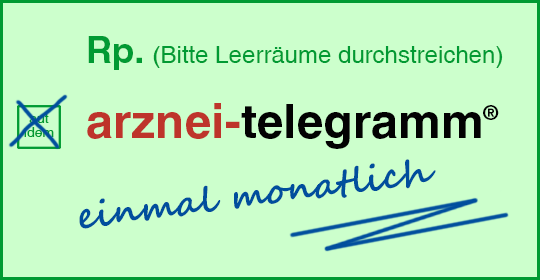Translation of a-t 2023; 54: 64
SIDE EFFECTS
Increased risk of aspiration in patients treated with GLP-1 agonists?
GLP-1 agonists such as semaglutide (OZEMPIC, WEGOVY) are used to treat type 2 diabetes, and some are marketed as weight reduction aids (see a-t 2023; 54: 57-61, a t 2016; 47: 47-8, 2020; 51: 25-8 and others). Among other things, their mechanism of action is based on a slowed emptying of the stomach. Gastrointestinal adverse effects such as nausea and vomiting occur frequently to very frequently.
The American Society of Anaesthesiologists (ASA) is currently suggesting that there may be an increased risk of regurgitation and aspiration in patients taking GLP-1 agonists due to the delayed gastric emptying.1 This is based on individual reports2,3 and small studies,3,4 according to which food and liquid residue remains in the stomach more frequently in patients using GLP-1 analogues than in those who do not use them despite compliance with the specified fasting periods, particularly if there are concomitant gastrointestinal adverse effects.3
Although the data are currently limited, the ASA advises to take precautionary measures.1 Holding of GLP-1 agonists before planned anaesthesia or sedation should be considered - on the day of the surgery if the patient uses the medication daily or a week before if the patient is on a weekly dose regime. If these recommendations are not complied with, a "full stomach" should be assumed with the corresponding risk for anaesthesia, or if necessary the gastric volume should be evaluated using ultrasound. If this is not possible or the stomach is full, delaying the surgery should be considered. This should also be considered if the patient has gastrointestinal symptoms on the day of the surgery.1
In response to our request, the German Society of Anaesthesiology and Intensive Care Medicine (DGAI) informed us that they would "very likely" (subject to final scientific agreement) support the ASA's recommendations relating to holding the medication, but they did not think that delaying the surgery would be necessary in the event that the medication is accidentally continued, for example.5 In this situation, special precautions like those for patients with a "full stomach" (rapid sequence induction) should be recommended. An official publication is planned by the end of the year as part of the review of the recommendation "Preoperative evaluation of adult patients of elective, non-cardiothoracic surgery".5
British recommendations on GLP-1 agonists in perioperative care are under review as a result of the ASA's statement.6,7 They did not previously advocate holding GLP-1-agonists.7,8 The American Food and Drug Administration (FDA) is currently evaluating a possible risk of regurgitation and aspiration in patients treated with GLP-1 agonists under anaesthesia and deep sedation.9 The European Medicines Agency (EMA), meanwhile, does not currently consider there to be a risk that would necessitate a safety review.10
| 1 | American Society of Anesthesiologists (ASA): Press release of 29 June 2022; https://a-turl.de/r93m |
| 2 | KLEIN, S.R., HOBAI, I.A.: Can. J. Anaesth. 2023; 70: 1394-6 |
| 3 | SILVEIRA, S. Q. et al.: J. Clin. Anesth. 2023; 87: 111091 (24 pages) |
| 4 | KOBORI, T. et al.: J. Diabetes Investig. 2023; 14: 767-73 |
| 5 | Deutsche Gesellschaft für Anästhesiologie und Intensivmedizin e.V. (DGAI, German Society of Anaesthesiology and Intensive Care Medicine): Correspondence dated 8 and 10 August 2023 |
| 6 | UK Clinical Pharmacy Association (UKCPA): Correspondence dated 7 August 2023 |
| 7 | UK Clinical Pharmacy Association (UKCPA): Handbook of Perioperative Medicines, Medicine Monographs: Glucagon-like Peptide-1 (GLP-1) Receptor Agonists; https://a-turl.de/556y |
| 8 | Centre for Perioperative Care (CPOC): Guideline for Perioperative Care for People with Diabetes Mellitus Undergoing Elective and Emergency Surgery, dated March 2021; https://a-turl.de/aye6 |
| 9 | FDA: Correspondence dated 4 August 2023 |
| 10 | EMA: Correspondence dated 21 July 2023 |
© arznei-telegramm (Berlin/Germany), August 2023, protected by copyright laws.
Autor: Redaktion arznei-telegramm - Wer wir sind und wie wir arbeiten
Diese Publikation ist urheberrechtlich geschützt. Vervielfältigung sowie Einspeicherung und Verarbeitung in elektronischen Systemen ist nur mit Genehmigung des arznei-telegramm® gestattet.
